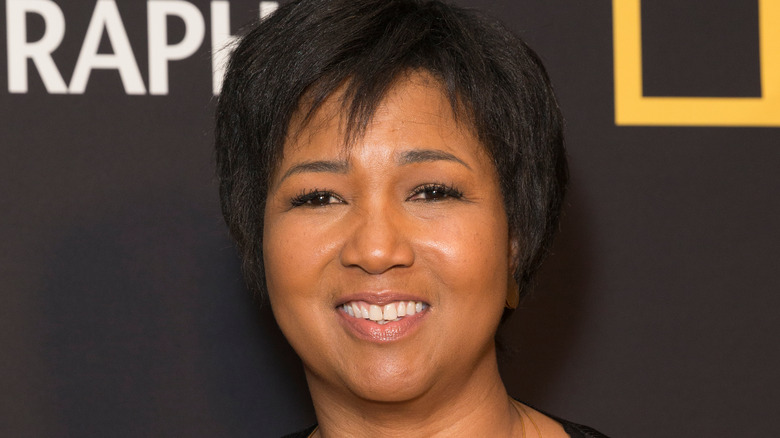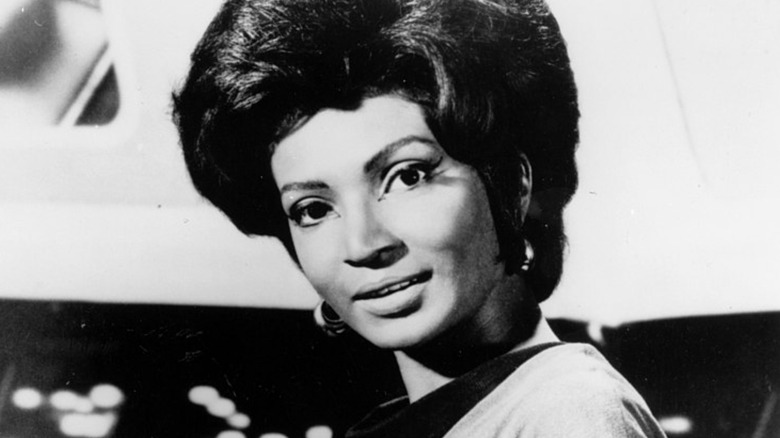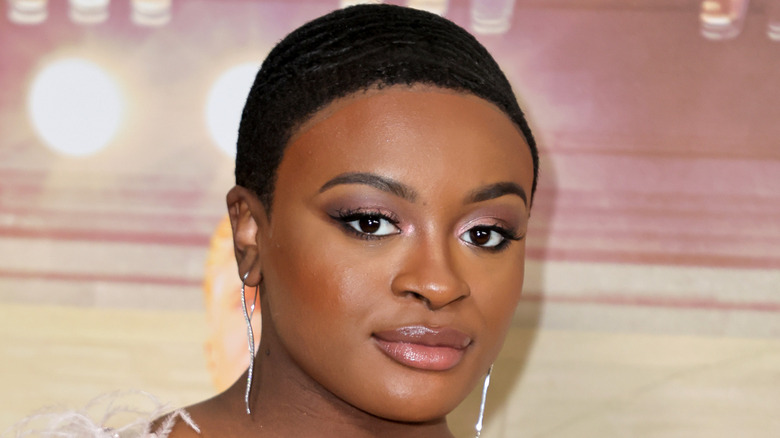This Iconic TV Character Paved The Way For A Groundbreaking Astronaut
Many TV viewers, even those who favor historical dramas over science fiction, are familiar with the groundbreaking "Star Trek" character Lieutenant Nyota Uhura, played by Nichelle Nichols. The original series of "Star Trek," often referred to as "TOS," aired on NBC from 1966 to 1969 (per NBC News). As the Chief Communications Officer on the starship Enterprise, Lieutenant Uhura's knowledge of the languages and cultures of worlds outside our solar system was essential to the success of her fellow crew members' missions. As David Gerrold, a screenwriter for "TOS" put it in an interview with Smithsonian Magazine, "She's the most important person on the bridge! When Lieutenant Uhura says 'Captain?,' everybody turns around to look."
In the same interview, Gerrold noted that although multiracial casting on major television shows is a commonplace now, casting Nichols in 1966, at the height of the American Civil Rights Movement, was a significant milestone. Another "TOS" screenwriter, D.C. Fontana, remarked to Smithsonian that in response to NBC affiliates threatening not to air "TOS" due to Nichols's presence on the bridge, series creator Gene Roddenberry had a definitive response: "Tell them to go to hell!"
Milestones and influence, on-screen and off
"Star Trek: The Original Series" also featured the first interracial on-screen kiss on American TV, between Lieutenant Uhura and Captain James T. Kirk, in the 1968 episode "Plato's Stepchildren," as noted in a recap by the science fiction publisher Tor. The show's production team and cast anticipated negative feedback from the public, but in a 2001 interview posted at TrekToday, Nichols said that the letters and phone calls of complaint they expected never materialized. Letters from viewers poured in, but Nichols could only recall one negative response, which wasn't all that harsh, anyway: "It was from a man in the South who said 'I don't believe in the integration of races and the fraternization of the races,'" but who couldn't object to the one-episode pairing of Kirk and Uhura.
One young viewer of "TOS" was Mae Jemison, who went on to become an astronaut. In a 2013 speech, Dr. Jemison spoke about what a strong influence the character of Lieutenant Uhura was on her commitment to exploring outer space. In a 2014 interview with the PBS science program "Nova" (posted on YouTube), Dr. Jemison also described her early and abiding interest: "I imagined myself going [to space], I studied all the things about the Apollo program. I knew what mission was going to take place [and] when, what it was supposed to accomplish." Dr. Jemison's experiences as a medical doctor specializing in biochemical engineering contributed to her successful application to NASA's astronaut program. She served one eight-day mission, aboard the Space Shuttle Endeavour, in 1992.
Mae Jemison's ambitious work after NASA
Dr. Mae Jemison's lifelong passion for the idea, reality, and future possibilities of space travel have led her to dream big even after leaving NASA. As she said in her opening address to Duke University's 2013 Race In Space conference, the possibility of experiencing life in outer space is "a part of our deepest longing as humans. Fundamentally we want to know who we are and where we come from."
One of Dr. Jemison's major post-NASA projects is 100 Year Starship, an initiative that aims to enable humans to travel from Earth to the next-closest star outside our solar system. Dr. Jemison is the project's principal. The lofty ambitions of 100 Year Starship encompass both the scientific and technological promises of such an endeavor while also addressing the many challenges we face to make the leap. Regardless of how long interstellar travel takes us to achieve, the project's website reads, the process of thinking it through "could generate transformative activities, knowledge and technologies that would dramatically benefit every nation on Earth in the near term and years to come."
Today, Dr. Jemison devotes her time to a variety of endeavors in the nonprofit, corporate, and educational spaces, as a co-founder of the Dorothy Jemison Foundation for Excellence, and as a member of the boards of directors for the Kimberly-Clark Corporation and The National Board for Professional Teaching Standards. In March 2022, Washington University in St. Louis announced that Dr. Jemison would be that year's Commencement Speaker.
An unexpected pep talk convinced Nichelle Nichols not to quit Star Trek
Ironically, Uhura's influence nearly did not come to full fruition. After the first season of "TOS" Nichelle Nichols was ready to leave the show, going so far as to resign formally because "I grew up in musical theatre and my dream was not to be a TV or movie star," but to be on Broadway (per Smithsonian). A chance meeting with her self-described biggest fan changed her mind.
While attending an NAACP event, Martin Luther King Jr. introduced himself to Nichols. During their conversation, Dr. King urged Nichols not to quit the show, telling her that "'TV is the most powerful education and [creator Gene Roddenberry] has changed everyone's attitudes towards women and people of color." The conversation had its desired effect, as Nichols decided to return to the show the following week, remaining in the principal cast through its third and final season.
In the same interview with Smithsonian, Nichols related that in 1978, she gave a talk sharply criticizing NASA for how white and male their astronaut program still was. The Agency responded by inviting her to recruit women and young scientists of color to the program. Thanks to Nichols' first year of advocacy and recruitment efforts, NASA "picked five women, they picked three African-American men, they picked an Asian and the space program has represented all of us ever since."
Uhura's long-term legacy
In addition to Nichelle Nichols' advocacy and recruitment work for NASA, the last 50 years' worth of "Star Trek" TV franchises and films make it clear that Nichols' groundbreaking work was just the beginning of "Star Trek"'s commitment to portraying women and racial minorities in both rank-and-file and leadership positions throughout the galaxy.
In every spin-off series, from "Star Trek: The Next Generation" in the 1980s to the 2022 debut of "Star Trek: Strange New Worlds," audience members of many ethnic backgrounds and genders have been able to see themselves represented on-screen. According to the Internet Movie Database, a few of those notable roles and the actors who've played them include Lieutenant Commander Geordi La Forge, played by LeVar Burton ("Star Trek: The Next Generation"); Captain Benjamin Sisko, played by Avery Brooks ("Star Trek: Deep Space Nine"); Captain Michael Burnham, played by Sonequa Martin-Green, and Captain Philippa Georgiou, played by Michelle Yeoh ("Star Trek: Discovery"); and Number One, played by Rebecca Romijn ("Star Trek: Strange New Worlds").
Uhura's legacy has come full circle several times over the last half-decade. In 1987, she met Dr. Jemison on the set of an episode of "Star Trek: The Next Generation" when Dr. Jemison had a one-episode guest role (per The Mary Sue). And in 2022, several new generations of "Star Trek" fans will get to know Lieutenant Nyota Uhura (Celia Rose Gooding, above) all over again in "Star Trek: Strange New Worlds," set prior to "TOS," during Captain Christopher Pike's tenure on the USS Enterprise (per Paramount+).




